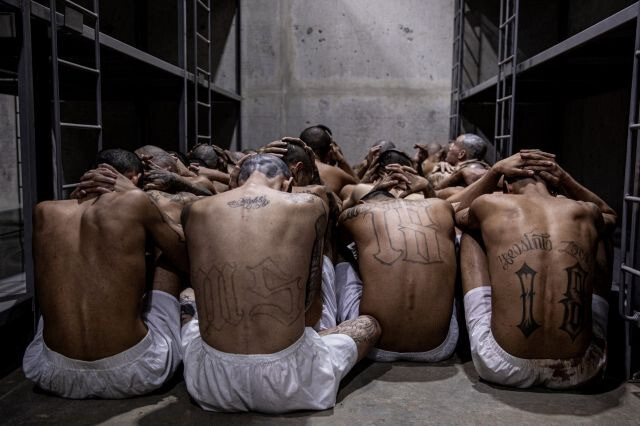
El Salvador's correctional facility, infamously known as the 'Terrorist Confinement Center' (CECOT), where the U.S. Donald Trump administration has outsourced the detention of foreign criminal gang members residing illegally in the United States, is drawing keen attention from Latin American countries struggling with chronic insecurity. For these nations, CECOT has emerged as a symbolic representation of a strong commitment to eradicating crime.
On the 30th of last month (local time), Ecuador's Ministry of National Defense announced in a press release that Defense Minister Gian Carlo Loffredo and Interior Minister John Reimburg had visited El Salvador's Terrorist Confinement Center (CECOT). The Ecuadorian government delegation lauded CECOT as "the most modern and secure correctional facility in Latin America," highly praising its location, ease of military access control, the cooperation system between the military, police, and correctional authorities, and its simple yet functional infrastructure. Minister Loffredo particularly emphasized, "We will bring the valuable ideas gained here back to Ecuador to strengthen our national correctional model," revealing a deep impression of CECOT.
El Salvador's CECOT, boasting the largest capacity in Central America with the ability to hold 40,000 inmates, was conceived under the ambitious vision of President Nayib Bukele. Built to efficiently isolate gang members designated as 'terrorists,' the facility has continuously sparked controversy over human rights violations due to strict restrictions on external activities and limited access for lawyers and family members. However, it is also considered a key factor in the dramatic stabilization of El Salvador's security situation, which was regarded as 'the worst in the world' just a few years ago, leading to conflicting views on its effectiveness.
Beyond Ecuador, several other Latin American countries, including Honduras and Paraguay, are paying close attention to El Salvador's 'Bukele model.' The Honduran government is pushing forward with the construction of a 'Center for Emergency Confinement (CRE)' with a capacity of 20,000 inmates in a remote eastern region and is also detailing plans for another 2,000-capacity prison on the Caribbean coast. This reflects the desperate situation in Honduras, which has suffered severe security issues within its correctional facilities, including a riot in a women's prison in 2023 that resulted in over 40 deaths and a clash between gangs in 2019 that claimed the lives of 18 inmates.
Paraguay is also working to increase its holding capacity by expanding existing correctional facilities and implementing a 'surprise inmate transfer' policy to prevent the concentration of gang power within specific prisons. Notably, the Paraguayan government publicly released photos in December 2023 showing inmates being transferred in their underwear, strikingly similar to the images frequently shared by El Salvadoran President Bukele on his social media accounts. This suggests that the Paraguayan government is also indirectly benchmarking El Salvador's hardline approach to crime suppression.
Meanwhile, CECOT has also become the center of international controversy as the U.S. Trump administration has utilized it as a place to 'outsource detention' for foreign criminal gang members apprehended within the United States. It is reported that the Trump administration accepted President Bukele's proposal of 'outsourcing detention' in exchange for budgetary support, leading to an expansion of CECOT's role beyond a mere domestic correctional facility to an international detention center for criminals.
Furthermore, international attention has intensified following the belated revelation that Kilmar Abrego Garcia, a legal resident of the United States mistakenly deported to El Salvador due to an error by the Trump administration, was once held in CECOT. The issue of Abrego Garcia's repatriation to the United States has escalated into a sharp conflict between the U.S. executive and judicial branches. The judiciary has ordered his return, holding the Trump administration accountable for the clear error in deportation, but the Trump administration strongly argues that this is a legitimate act of the President related to diplomacy and national security, and that the judiciary has no authority to intervene.
According to Reuters, President Trump recently stated that he had "not spoken directly with President Bukele about this issue," and avoided giving a clear answer on whether the Salvadoran government would return Abrego Garcia to the United States. This indicates that there are complex differences in opinion within the U.S. government regarding this matter.
El Salvador's CECOT is emerging as an attractive model for Latin American countries due to its strong crime suppression effects, but it also carries the serious problem of human rights violations against inmates. International human rights organizations have consistently voiced criticism regarding CECOT's inhumane detention conditions and its coercive operating methods that disregard legal procedures. While the Salvadoran government prioritizes security and implements strong policies, the human rights issues overlooked in the process are raising concerns in the international community, posing significant questions about the sustainability of the 'Bukele model.'
Ultimately, whether El Salvador's CECOT can become a simple benchmarking target for Latin American countries grappling with insecurity remains uncertain. This is due to the differences in each country's legal framework, human rights standards, and social context. If the focus remains solely on the 'efficiency' of the El Salvador model while neglecting the important value of human rights, it could lead to other forms of social unrest and conflict. Latin American countries must carefully compare the short-term crime reduction effects and the long-term social costs of the El Salvador case and seek balanced solutions tailored to their own situations.
[Copyright (c) Global Economic Times. All Rights Reserved.]






























